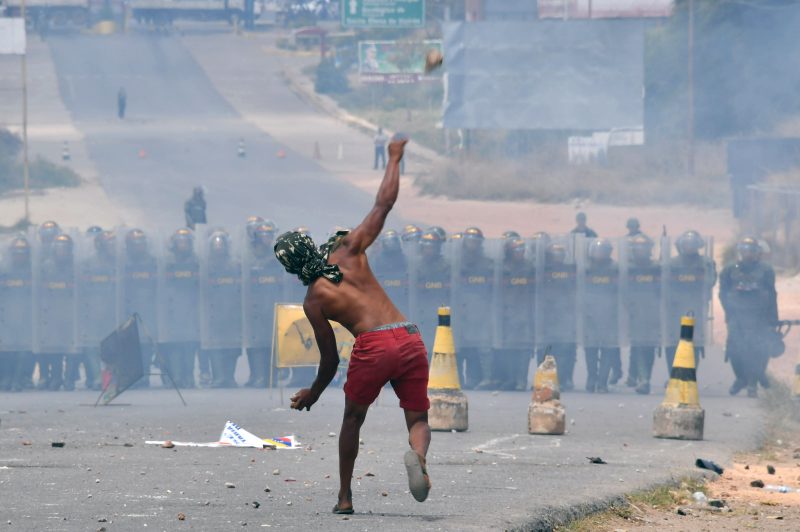US slaps new sanctions on Venezuela regime as Russia ups support
A demonstrator throws stones at Venezuelan National Guard troops on the border with Brazil at Pacaraima, Roraima state, on February 24, 2019 (Nelson Almeida)
Washington (AFP) – The United States and Russia clashed Friday over how to assist ailing Venezuela, with Moscow pledging new relief channeled through President Nicolas Maduro and Washington slapping sanctions over the blocking of US aid it tried to force through the border.
A day after Russia and China vetoed a US and European resolution at the UN Security Council that called for unimpeded aid deliveries, Washington said it was targeting six Venezuelan military officers for stopping last weekend’s US-led convoy.
Four people were killed in the melee as Maduro’s forces prevented the 178 metric tonnes of rice, beans and other food from crossing, with the leftist strongman seeing the aid as a pretext for a US-led invasion.
“We are sanctioning members of Maduro’s security forces in response to the reprehensible violence, tragic deaths and unconscionable torching of food and medicine destined for sick and starving Venezuelans,” Treasury Secretary Steven Mnuchin said in a statement.
The six include Major General Richard Jesus Lopez Vargas, the commander of the Venezuelan National Guard. The sanctions freeze any assets in the United States and penalize US financial dealings with the officials.
The United States also revoked the visas of “dozens” more officials and their families, said Elliott Abrams, the US special representative on the crisis.
Venezuelan opposition leader Juan Guaido, whom Washington has recognized as interim president, had hoped to triumph in bringing in the stockpiles of food, which the United States coordinated with Colombia and Brazil.
Guaido has said that 300,000 people could die without an influx of aid into Venezuela. The United Nations says 2.7 million Venezuelans have fled since 2015 as the socialist economy crumbles, with basic supplies out of reach to the masses.
– Russia steps up –
More than 50 countries recognize Guaido as Venezuela’s president — but Maduro enjoys strong support from Russia, which is eager to challenge US interventionism, as well as China, which is concerned over the fate of billions of dollars Beijing has lent to Caracas.
Russian Foreign Minister Sergei Lavrov, receiving Venezuelan Vice President Delcy Rodriguez in Moscow, said Russia was stepping up shipments of wheat and was considering sending more medical supplies after shipping 7.5 tonnes worth.
“We are very closely cooperating and coordinating all our steps in the international arena,” Lavrov said.
“This has acquired special significance now that Venezuela is facing a frontal attack and unabashed interference in its domestic affairs,” he said.
Abrams, the US envoy, charged that Maduro’s forces would turn Russian aid into a “political weapon” by providing it only to supporters.
“Obviously we are in favor of giving humanitarian assistance to Venezuela; we are not in favor of giving it to this corrupt regime,” Abrams told reporters in Washington.
Lavrov voiced hope that international pressure would “cool hotheads in Washington” who he said are seeking military intervention in Venezuela.
He alleged that the United States was planning to buy small arms, mortar launchers, and shoulder-fired anti-aircraft missiles from an “Eastern European country” and station them “close to Venezuela.”
– Warnings of force –
President Donald Trump has not ruled out military intervention in Venezuela, although even close US allies have said they would not support the use of force.
Republican Senator Marco Rubio, who has worked closely with Trump to seek Maduro’s ouster, appeared this week to suggest a violent climax as he posted on Twitter two pictures of Libyan dictator Moamer Kadhafi — one relaxed and smiling while in power, the other bloodied as he was lynched in an uprising.
Since last month, more than 50 countries have recognized Guaido, a 35-year-old political newcomer who has united the often fractious Venezuelan opposition.
Defying a travel ban by Maduro, Guaido went first to Colombia to try to bring in the aid and to meet with visiting US Vice President Mike Pence. Guaido continued on to Brazil, where he met with the new right-wing president, Jair Bolsonaro, and on Friday traveled to Paraguay.
Speaking to reporters in Brasilia on Thursday, Guaido said he would return home “at the latest on Monday” despite threats to arrest him.
Abrams said that the United States was “very concerned” about Guaido’s ability to return home safely and warned of a “very large reaction” if he is arrested.
Disclaimer: This story is published from a syndicated feed. Siliconeer does not assume any liability for the above story. Validity of the above story is for 7 Days from original date of publishing. Content copyright AFP.


